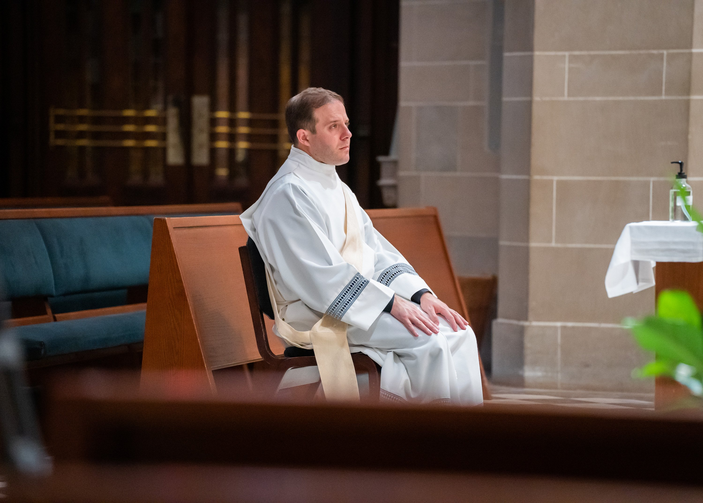
Father Matthew Hood is seen at the Cathedral of the Most Blessed Sacrament in Detroit Aug. 17, 2020.
On the sabbath day we went outside the gate by the river, where we supposed there was a place of prayer; and we sat down and spoke to the women who had gathered there. A certain woman named Lydia, a worshiper of God, was listening to us; she was from the city of Thyatira and a dealer in purple cloth.
The Lord opened her heart to listen eagerly to what was said by Paul. When she and her household were baptized, she urged us, saying, “If you have judged me to be faithful to the Lord, come and stay at my home.” And she prevailed upon us.
Acts 16:11-15
I read a weird story the other day which seems to epitomize the worst in religion and would likely cause some to say "that's why I don't darken the door of a church." I may have wavered on becoming an atheist for a minute or two myself. It was about a Roman Catholic priest, Father Matthew Hood, who discovered that his baptism as an infant, thirty years earlier, was considered invalid.Why? Because the formula or phrase used was incorrect. Instead of the church's ancient formula "I baptize you in the name of the Father, and of the Son, and of the Holy Spirit," the words "We baptize you..." were used.
Wait, there's more! Because this priest was invalidly baptized, and therefore not actually confirmed, he is not validly a priest either. Therefore, everyone who had sacraments from him, including marriage, must be contacted because they are not kosher. Strangely, the baptisms he performed are valid because he used the correct formula and baptism does not require an ordained priest.
When we read about baptisms in the New Testament they are baptized into Christ, often in informal settings with no footnotes to indicate that on each occasion a certain formula was used. Obviously the intention of the priest's baptism was honest, as was the priest himself. I find this appalling and more of an indication of hierarchical church control that doctrinal purity.
The United Church of Canada has affirmed the traditional doctrinal formula so that we can be part of ecumenical bodies around the world but we permit other wording which may be more inclusive.
Wouldn't it be wonderful if we simply focused on our inclusion in Christ through the sacrament rather than singular or plural pronouns?
No comments:
Post a Comment